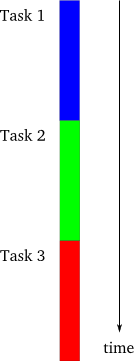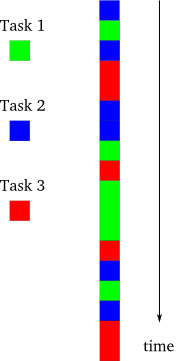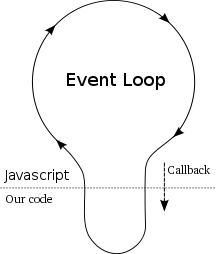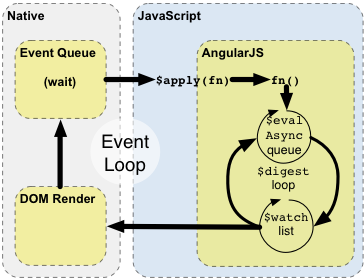- Suppose a program consisting of 3 distinct tasks
- Tasks are performed one at a time
- Always in a defined order
- Simplest style of programming
Why Promises ?
Let's step back to the basics
Single thread synchronous model aka. blocking

Multi threaded model
- Tasks run in separate threads
- Threads are handled by the OS
- Threads can run concurrently
- They often end up just waiting
- Or interleaved together in single CPU
- Tasks might get suspended arbitrarily by OS
- Thread communication and synchronisation is a diffcult topic

Single thread asynchronous model = Javascript
- Tasks interleaved inside the same Thread
- Goodness of synchronous + multithreaded
- Programmer in control, not the OS
- Tasks are not suspended arbitrarily

Single thread asynchronous model = Javascript
The event loop handles task scheduling
// Event loop pseudo code
for(;;) {
if (endOfProgram)
quit();
if(eventToHandle) { // task waiting, task finished ...
handleEvent(eventToHandle); // Callback
}
}

Single thread asynchronous model = Javascript
Therefore
- Each task must be non blocking
- Otherwise you get freezes and lags

Stupid Asynchronous API: Callbacks
Asynchronous = Non Blocking
Callbacks are a way to make tasks non blocking
task1(function task2(task1Result) {
// do something with task 1 result
})
var task1 = function(callback) {
result = longRunningTask(); // Blocking call
callback(result); // Calling a passed callback
}
Stupid Asynchronous API: Callbacks
Asynchronous = Non Blocking
Callbacks are messy
$('#button').click(function () {
askForTwitterHandle(function(twitterHandle) {
twitterHandle.getTweets(function (tweets) {
processTweets(function (processedTweets) {
ui.show(processedTweets);
});
});
});
});
Callbacks error handling is worse, no exception propagation
$('#button').click(function () {
askForTwitterHandle(function(twitterHandle) {
twitterHandle.getTweets(function (tweets) {
...
});
}, function onFailure(error) {
handleError(error);
});
});
In the synchronous model we have try/catch
try {
handle = askForTwitterHandle();
tweets = handle.getTweets();
...
} catch (errorMessage) {
console.log('I messed up');
}
Promises are the right abstraction
Instead of calling a passed callback, we return a promise
ajax('template.html', function(err, template) {
if (err)
handleError();
render(template);
})
// Becomes
var promiseForTemplate = $http.get('template.html');
promiseForTemplate.then(render, handleError)
Promises guarantees
promiseForTemplate.then(onFulfilled, onFailed);
- Only one of onFulfilled or onFailed will be called
- onFulfilled will be called with a single value (return value)
- onFailed will be called with a single rejection reason (thrown exception)
- If the promise if already settled, the handlers are guaranteed to be called anyway
- The handlers will always be called asynchronousy
Promises can be chained
//
var transformedPromise = promiseForTemplate.then(onFulfilled, onFailed);
- If onFulfilled returns a value
- transformedPromise is resolved with that value
- If onFulfilled returns a promise
- transformedPromise will adapt it's state
- If onFailed throws an exception
- transformedPromise will be rejected with that exception
Example
Sync
var user = getUser(); // blocking, ie, prompt for password
var username = user.name;
Async with Promise
var userNamePromise = getUser().then(function (user){
return user.name;
})
Example: throwing an exception
Sync
var user = getUser(); // blocking, ie, prompt for password
if (user === null)
throw new Error('null user');
Async with Promise
var userPromise = getUser().then(function (user){
if (user === null)
throw new Error('null user');
return user;
})
Example: handling an exception
Sync
try {
updateUser(data);
} catch (exp) {
console.log('There was an error', exp);
}
Async with Promise: exception propagation
var updateUserPromise = updateUser(data).then(undefined, function(exp) {
console.log('There was an error', exp);
})
Example: exception propagation
Callbacks
getUser('spike', function(err, user){
if(err) {
ui.error(err);
} else {
getBestFriend(user, function(err, friend){
if (err) {
ui.error(err);
} else {
ui.showBestFriend(friend, function(err, friend){
if (err) {
ui.error(err);
}
})
}
})
}
})
Example: exception propagation
Promises
getUser()
.then(getBestFriend)
.then(ui.showBestFriend)
.then(undefined, ui.error)
Promises in Angular
- Provided by $q service
- Inspired by the the promise/deferred
Q library - Promises are used everywhere Angular needs async
- $http
- $resource
- $routeProvider
- Controller properties
- Response Interceptors
- ...
- Is a lightweight implementation of Promises (Q is much more complete)
- Optimized for the Angular run loop
Angular Run Loop

How to use Promises in Angular
.controller('testCtrl', function($scope, $q) { // inject the service
var promiseOfTask = function () {
var deferredTask = $q.defer(); // create a deferred object
var result = blockingTask(); // long running task
deferredTask.resolve(result) // resolve the future promise with the result
return deferredTask.promise // return the promise
}
//using the promise
promiseOfTask().then(function(result){
$scope.updateSomeModel(result);
})
})
Demonstration
Handling failovers for api calls
Resources:
- Learn more about promises:
commonJS Promises/A - Best tutorial on deferred programming:
Python Twisted & Deferreds - Async with coroutines:
Generators in Javascript
Twitter: @sp4ke
Github: sp4ke
Demo code: github.com/sp4ke/angular-promises
Send your love in Bitcoins: 1PPaGXh8wihVPBzyobLq557vHCfsjJdBQk